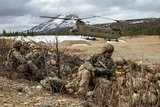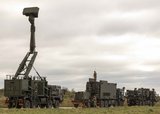RCO defends Project Mosquito cancellation, claiming investment stopped making sense
Concept art showing the UK's Lightweight Affordable Novel Combat Aircraft (Image: UK MoD)
The Rapid Capabilities Office (RCO) in the UK RAF has told Shephard that the surprising decision to cancel Project Mosquito was based on continued investment in the effort no longer making ‘a huge amount of sense’.
Targeted at developing a low-cost, UK-made uncrewed fighter aircraft, Project Mosquito would have seen a Lightweight Affordable Novel Combat Aircraft (LANCA) demonstrator, designed by lead contractor Spirit Aerosystems Belfast and partners Northrop Grumman and Intrepid Minds, make its first flight in 2023.
However, following a detailed review, the MoD abruptly ended those plans when it announced on 24 June that the project will not move beyond a
Already have an account? Log in
Want to keep reading this article?
More from Farnborough Airshow 2022 News (FIA 2022)
-
![Farnborough 2022: MBDA outlines vision for Tempest Weapon Effects Management System]()
Farnborough 2022: MBDA outlines vision for Tempest Weapon Effects Management System
Last week saw big announcements by Team Tempest and MBDA was eager to talk about their own progress at the Farnborough International Airshow.
-
![Farnborough 2022: PBS confirms four customers for its new turbojet engine]()
Farnborough 2022: PBS confirms four customers for its new turbojet engine
Shephard met PBS Velka Bites at the Farnborough International Airshow to discuss the unveiling of its new turbojet engine and future developments.
-
![Farnborough 2022: Live exercises to move virtual very soon, says BAE Systems]()
Farnborough 2022: Live exercises to move virtual very soon, says BAE Systems
VRAI joins BAE Systems to further develop a single synthetic environment for multi-domain training in a virtual environment.
-
![Farnborough 2022: Mexican aerospace bounces back after COVID-19 but military aviation procurement remains sluggish]()
Farnborough 2022: Mexican aerospace bounces back after COVID-19 but military aviation procurement remains sluggish
Following a damaging period of decreased exports amid the COVID-19 pandemic, the Mexican aerospace industry has begun to bounce back with a particular focus on UAV procurement.
-
![Farnborough 2022: Babcock partners with Rafael for UK land ground-based air defence programme]()
Farnborough 2022: Babcock partners with Rafael for UK land ground-based air defence programme
Babcock and Rafael have joined forces to provide C2 solutions for a GBAD programme in the UK.
-
![Farnborough 2022: L3Harris reaffirms focus on optimising UK C4ISR]()
Farnborough 2022: L3Harris reaffirms focus on optimising UK C4ISR
The aerospace and defence technology provider is ready to support the UK land, air and naval forces with communication and digitisation technologies in the coming years.

























